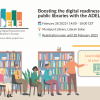ESCO v1.1 Launch Event - Live Webinar

Almost 5 years have passed since ESCO, the European multilingual classification of Skills, Competences and Occupations, was first launched - and the European Commission is working on a new major release that reflects labour market changes influenced by the digital and green transition.
To celebrate this milestone and present ESCO v1.1, the Commission is hosting a live webinar on 10 February 2022 from 9.30 to 12.30 CET, with a keynote speech by European Commissioner for Jobs and Social Rights, Nicolas Schmit.
About this event
The event takes place online, via Microsoft Teams. To register for the event, please fill in this online form before 8 February 2022.
The webinar is open to all ESCO stakeholders and wider networks of organisations, researchers and social partners and stakeholders in digital skills and jobs from all around Europe. It is an opportunity to:
- Learn more about the key features of ESCO version 1.1 and discover what has changed with this new release;
- Engage with ESCO implementers and contributors, ask technical questions and discover what this new release means for your services, and how best to work with this versioning system;
- See first-hand the new ESCO portal and its improved features;
- Find out more about the methodological approach for updating and maintaining a taxonomy like ESCO using AI and machine learning (showcasing how machine learning has been used to update and maintain the classification, including tagging green skills and occupations and why this is important).
Why ESCO v.1.1?
The new release of ESCO comes 5 years after its first launch (version 1.0 kicked off in July 2017). Originally developed by the European Commission to support better job-matching, tailored career guidance, up- and re-skilling, ESCO's new version includes new occupations and skills and a revised transversal skills hierarchy that is in line with skills demand and supply.
In addition, the advance of digital technologies in areas like recruitment, career support and labour market research has altered the sector, opening up new opportunities to match candidates and their skills, with organisations and recruiters. AI and machine learning techniques and tools like language processing, semantic matching and others, have contributed to more efficient and innovative services to help the unemployed, students and lifelong learners develop the skills they need to thrive in the world of work.
Interested?
Use this online form to register for the event before 8 February - and help us spread the word!
© European Commission




